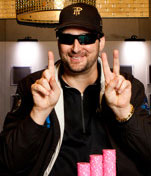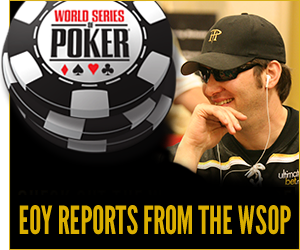-
Leaving 14 Dimes in the Sand
After being eliminated from the World Poker Tour event in Aruba, I was contractually committed to stay another five days. Normally, the minute I’m eliminated from a tournament, I’m looking to hop aboard the first flight home. But this was Aruba, and my wife was with me, so I was more than happy to hang out. Meanwhile, I decided to play some poker in the side games for a few hours a day, both at the Holiday Inn and at the Radisson.
Late one night, at about 3 a.m. when my high-limit, lowball game broke up, I hopped into a no-limit Hold ’em side game with $25-$50 blinds. I bought in for $4,000, and the very first hand I was dealt was Kd-Qd, followed by a flop of Qh-Qc-4d. So, of course, I doubled up when someone with Q-J moved all-in. Within 45 minutes I had 23 dimes (a “dime” is a thousand dollars) in front of me, and I was on a rush (which means simply that you’re winning a ton of pots).
In first position in a subsequent hand, I made it $100 to go without looking at my cards — this is called a “straddle” — which gave me the right to raise it up if anyone else called the $100 bet. Everyone folded to player SA (for super-aggressive!) in the big blind, and he raised it up, making it $500 to go. I looked down at 7d-5c, and decided to call the bet with this incredibly weak hand, for four reasons.
First, I had $23,000 in front of me, and so did player SA, so I’m thinking that it would cost me $500 to try to get lucky and win a huge pot. Second, I felt like player SA, seated to my right, was the kind of player that might lose the whole $23,000 to me if I did hit my hand; again, he was super-aggressive. Third, I felt I was reading my opponent really well. And finally, I had position, which meant that player SA had to act before me each round.
The flop came down 5s-4s-2h, and player SA bet out $1,100. At this point I felt he was exuding extreme weakness, but I decided only to call his bet. The next card was the 7h, for 5s-4s-2h-7h, and player SA bet out $2,200. Now I had an easy raise, since I had just made top two pair, but I decided that I would let player SA take one more bluff at it was the last round of betting. Thus I merely called his bet. The last card was the 2d, and player SA bet out $6,000. My plan had worked; all I had to do was call the $6,000 bet and take down the $14,000 pot!
But for some reason I could not pull the trigger. I reasoned that if player SA had a pocket pair higher than sevens or a deuce in his hand, then he had me beat. I studied this, and then I made a really bad move: I counted my chips! I saw that I was up at least 16 dimes, and I thought, “OK, if I quit now I win $16,000.” I wasn’t getting a read one way or another from player SA, but I knew he was more than capable of bluffing (this was, after all, one of the reasons I just called on the last round of betting).
I should have counted the $6,000, put it out in front of me, and spent my time studying my opponent, not counting my chips. Most of all, when I merely called on the third round of betting, I was committing myself to making the call on the last round of betting. Unthinkably, I didn’t follow through with my own plans, or spend enough time reading my opponent. Rather, I folded my hand.
Now player SA showed his hand, the Jh-9h, and laughed at me! He had picked up a flush draw when the 7h hit on the turn — and he needed only a heart on the last card. I played one more hand and quickly quit the game, feeling a bit angry at myself. Sure, I had won $16,000, but I had left $14,000 on the table.
What is a “dime”:
A) an assist in basketball
B) $1,000
C) 10 cents
D) all of the aboveAnswer: B
Related Posts
- ‘High’ Stakes Poker
- Going for the Big M in Monte Carlo
- Still Doing Monte Carlo in Style
- Doing Monte Carlo in Style
- Hot Streak Freezes With a Cooler
- Chan Goes Down in the TOC
- Tournament of Champions
- Nice Guy Flushes Hellmuth’s Victory
- No-Limit at Roddick’s House
- Aruba’s ‘Bubble Boy’ Smiled
Recent Posts
- WSOPE 2nd place finish
- Update from this years WSOP 2019
- Happy Holidays! Updated stock at Poker Brat, new book!
- Phil Hellmuth wins historic 15th World Championship!
- Final golden ticket winner coming soon
- Poker Brat – The Phil Hellmuth Jr. Autobiography
- Phil Hellmuth’s “Pokerbrat” – Coming soon to audio book!
- Poker Night in America – Sugar House Casino
- Sugar House w Matt Glantz
- Lost and found

 ™
™








